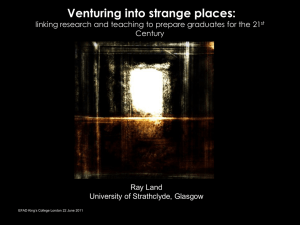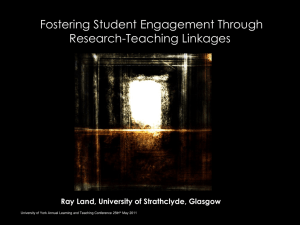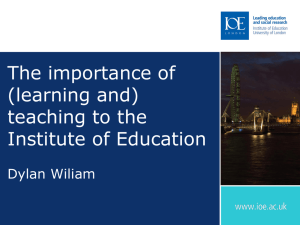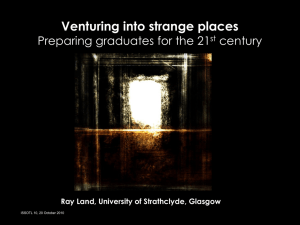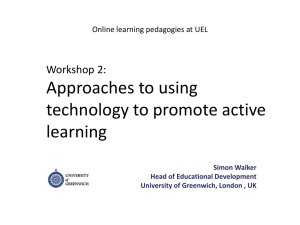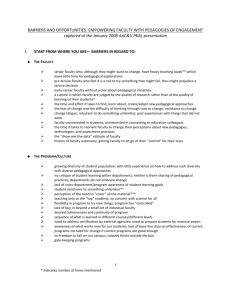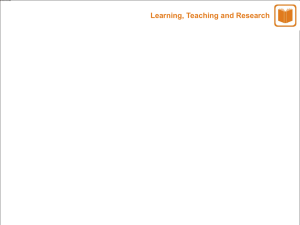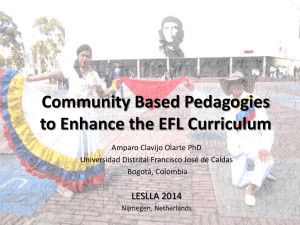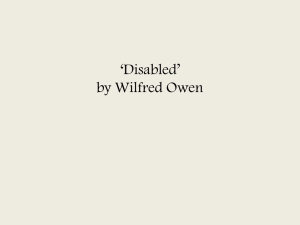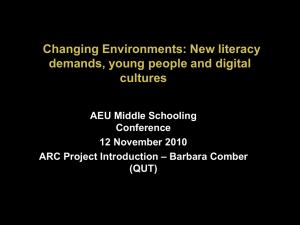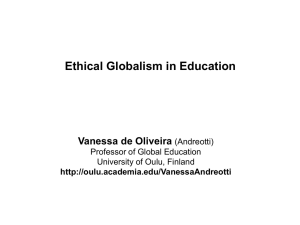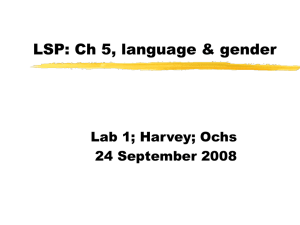- Society for Research into Higher Education
advertisement
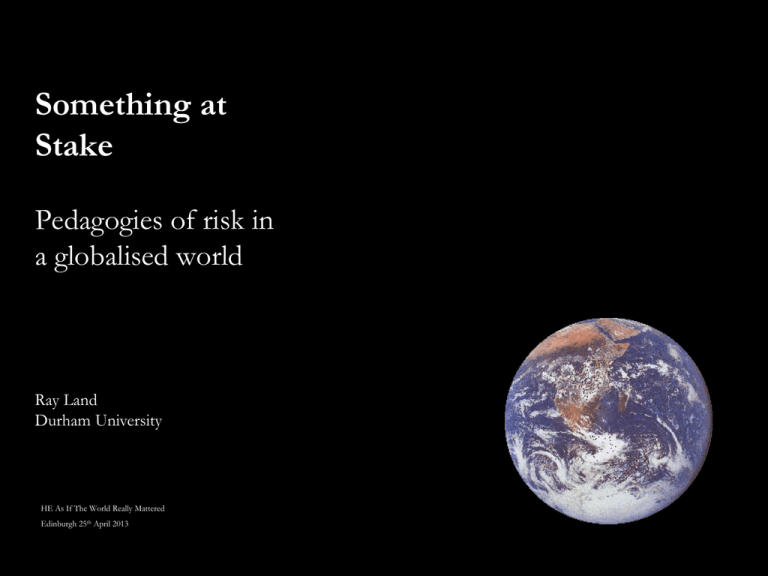
Something at Stake Pedagogies of risk in a globalised world Ray Land Durham University HE As If The World Really Mattered Edinburgh 25th April 2013 Pedagogies of uncertainty I would say that without a certain amount of anxiety and risk, there's a limit to how much learning occurs. One must have something at stake. No emotional investment, no intellectual or formational yield. (Shulman Pedagogies of Uncertainty, 2005:1) Growth in higher education spending 1990-2001 growth in scientific research over the period 1990-2001 • • • • • • • • • • • • • • Speed and acceleration Uncertainty Complexity Multiculturalism Mobility of the population Conflict (social, military) Inter-generational tension Need for ethical citizenship Information saturation Proliferation of knowledge Globalisation Internationalisation Private /public sector tension Increasing panic Characteristics of the 21st century • • • • • • • • • • • • • • Unpredictability Risk Need for flexibility and agility Entitlement v responsibility Scarcity of resources Austerity Sustainability Need for prudence Transparency & accountability Discontinuity and rupture Shifting paradigms Poverty v affluence Outsourcing of jobs Youthfulness The dogmas of the quiet past, are inadequate to the stormy present. The occasion is piled high with difficulty, and we must rise with the occasion. As our case is new, so we must think anew and act anew. We must disenthrall ourselves … Abraham Lincoln, Outline 1. Speed, the unsettling of knowledge & the death of geography (theory of fast and slow time) 2. Troublesome Knowledge: venturing into strange places 3. ‘Re-inventing’ students to work across cultural differences 4. Future pedagogies: risk, dissensus, profusion 1. Speed & the Unsettling of Knowledge The goal of university research is the creation, dissemination, and preservation of knowledge. At Harvard, where so much of our research is of global significance, we have an essential responsibility to distribute the fruits of our scholarship as widely as possible.” Steven E. Hyman Provost of Harvard University digital text – loss of closure and fixity of printed page– a shift in epistemology shift in medium implies shift in reading mode, from literacy to multimodality, technoliteracy, visual sophistication, (Kress) shift in reading mode requires a further shift, in subjectivity (Pelletier) process fragmentation exploration visual volatility fast time consensus openness artefact cohesion exposition textual stability slow time authority containment text stability individual private image mutability collective public What forms of ‘technoliteracy’ do we need to work in these spaces? How do these texts and technologies change the way academic knowledge is produced and distributed? volatility and instability of digital text infinitely editable, instantly distributable, ‘These sections of the web break away from the page metaphor. Rather than following the notion of the web as book, they are predicated on microcontent. Blogs are about posts, not pages. Wikis are streams of conversation, revision, amendment, and truncation.’ Alexander, 2006 Textualities, temporalities, power fast and slow time (Eriksen 2001) Anything worth doing is worth doing s-l-o-w-l-y ... ‘..smaller, faster, cheaper .. NASA’ Speed Virilio 2000, Eriksen 2001, Honoré 2004 supercomplexity death of geography issues of democratic space advent of universal real time tyranny of the moment slow and fast time ‘presentified’ history single gaze of the cyclops the universal accident The ‘tyranny of the moment’ - effects of speed (Eriksen 2001) speed is an addictive drug speed leads to simplification speed creates assembly line (Taylorist) effects speed leads to a loss of precision speed demands space (filling in all the available gaps in the lives of others) • speed is contagious – when experienced in one domain the desire for speed tends to spread to new domains. • gains and losses equal each other out so that increased speed does not necessarily even lead to greater efficiency. • • • • • Eriksen laments the disappearance of ‘slow’ principles of order, deliberation, reflection, completeness, coherence, narrative. Would the erosion of such principles constitute a crisis in institutional identity for the university? The hegemony of the fragment ‘...when growing amounts of information are distributed at growing speed, it becomes increasingly difficult to create narratives, orders, developmental sequences. The fragments threaten to become hegemonic. This has consequences for the ways we relate to knowledge, work and lifestyle in a wide sense. Cause and effect, internal organic growth, maturity and experience; such categories are under heavy pressure in this situation’ (Eriksen 2001:113). authority? gatekeeping – Mark Poster’s exploration of how digitisation shifts history as a discipline – breaking down boundaries – if all historical resources are ‘googled’, if all history work is instantly publishable, how does that affect who counts as an historian? or a journalist? what is the role of the university, of the discipline? Text to image History only happens in the present. Today historians are being pushed around by the media. … Today the media no longer exists as narratives but rather as flashes and images. History is therefore being reduced to images’ (Virilio 1999a:57). public/private continuum • displacement of slow time to the private sphere • home life compromised by 24/7 digital The risk of the digital: The DEFRA wiki the five minute university Fr. Guido Sarducci, rock critic, l’Osservatore Romano, Vatican. http://www.youtube.com/watch?v=kO8x8eoU3L4 ...‘smaller, faster, cheaper’ ..? • Coventry University – 18 month degree ‘lite’ @ £3,500 p.a. • Buckingham University 2 yr degree. • Tweets • Pecha Kucha (‘chit-chat’) - 7 mins, 14 slide presentations 2. Troublesome Knowledge Real learning requires stepping into the unknown, which initiates a rupture in knowing... By definition, all TC scholarship is concerned (directly or indirectly) with encountering the unknown. Schwartzman 2010 p.38 pax intrantibus, salus exeuntibus (1609) Threshold Concepts I am part of all that I have met; Yet all experience is an arch wherethro’ Gleams that untravell’d world, whose margin fades For ever and for ever when I move. Tennyson ‘Ulysses’ The engagement by the learner with an unfamiliar knowledge terrain and the ensuing reconceptualisation may involve a reconstitution of, or shift within, the learner’s subjectivity, and perhaps identity. Ontological implications. Learning as ‘a change in subjectivity’. (Pelletier 2007). Liminality • a transformative state that engages existing certainties and renders them problematic, and fluid • a suspended state in which understanding can approximate to a kind of mimicry or lack of authenticity • liminality as unsettling – sense of loss Characteristics of a threshold concept • integrative • transformative • irreversible • bounded • re-constitutive • discursive • troublesome East of Eden through the threshold Some natural tears they dropped, but wiped them soon; The world was all before them, where to choose Their place of rest, and Providence their guide. They, hand in hand, with wandering steps and slow, Through Eden took their solitary way. John Milton (Paradise Lost, Book XII; 1667) Troublesome knowledge • ritual knowledge • inert knowledge • counter-intuitive knowledge • conceptually difficult knowledge • the defended learner • alien knowledge • tacit knowledge • loaded knowledge ‘Venturing into strange places’ 'our ignorance expands in all kinds of directions' (p.250) Need for creative 'knowing-insitu' and imagination. Mode 3 knowledge where all our knowledge - of the world, of our situations, of ourselves is contested. Pedagogy must be founded on openness, mutual disclosure, personal risk and disturbance' (p.258). (Barnett 2004: 247-260) CIHE international / intercultural attributes Knowledge • world geography, conditions, issues and events • complexity and interdependence of world events & issues • understanding of historical forces that have shaped the current world system • knowledge of a foreign language, intercultural communication concepts, international business etiquette CIHE international / intercultural GAs Attitudes • openness to learning & positive orientation to new opportunities, ideas and ways of thinking. • tolerance for ambiguity and unfamiliarity. • sensitivity & respect for cultural differences. • empathy or the ability to take multiple perspectives. • self-awareness and self esteem about one’s own identity & culture. CIHE international / intercultural GAs Skills • • • • research skills to learn about the world critical and comparative thinking skills ability to think creatively and integrate knowledge ability to use another language effectively and interact with people from other cultures • coping and resiliency skills in unfamiliar and challenging situations 3. ‘Re-inventing’ Students For apart from inquiry, apart from the praxis, individuals cannot be truly human. Knowledge emerges only through invention and re-invention, through the restless, impatient, continuing, hopeful inquiry human beings pursue in the world, with the world, and with each other.” ― Paolo Freire 1970 Pedagogy of the Oppressed Interculturalism Cultural practice ‘The chains of habit are generally too small to be felt until they are too strong to be broken’. Dr Samuel Johnson 1709 - 1784 fraught (histrionic) discourse • • • • • • • • • • • the darker side of modernity epistemic racism epistemic violence cultural blindness epistemic amnesia abyssal thinking ‘damned’ epistemologies barbarians of knowledge discourse of pathology blood identities psychic infantilism Ecological catastrophe Poverty (destruction of humanity) Eurocentrism Ontology of consumption Resistance (Impossibility of subsumption of peoples and cultures) Abyssal thinking (Santos 2007) Understanding the historical effects of abyssal lines on both sides of the line, can help educators recognise the mechanisms that privilege European / Western epistemologies and ‘forget’, silence, repress or ‘damn’ ‘other’ epistemologies (from Andreotti 2011) Valorised perspectives • • • • • • • • • • • • Social justice Equity Sustainability Inclusivity Ecologies of knowledge Interconnectedness Interdependence Decoloniality Diversality Re-imagining Difference Counter hegemony • • • • • • • • • • • • • Co-presence Cognitive justice Pluralistic propositional thinking Incompleteness Inter-knowledges Situated theoretical approaches Prudent knowledge Intervention in the world Geopolitical relations Solidarity Values-based analysis Border knowledge Cosmopolitanism Troubling discourses Sources of troublesomeness: perceived barriers to global citizenship or ‘cosmopolitanism’ • • • • • • • • • • • Ethnocentricism Ahistoricism Depoliticisation Paternalism Eurocentrism Territorial difference Instrumentalism Cultural relativism Epistemic racism Abyssal thinking Hegemony • • • • • Subordination of the periphery Homogenisation Coloniality of power Coloniality of being Dualisms /unhelpful binaries desiderata • • • • • • A transmodern view, re-imagining modernity An ethics of liberation Adoption of border positions Ecologies of knowledge An alternative thinking of alternatives (Santos 2007 p.10) A ‘decolonial grammar of critical analysis which would recognise its own vulnerability’ (Maldonado-Torres 2004 p.52) • An epistemology of the South • A ‘general epistemology of the impossibility of a general epistemology’ • A different locus of enunciation (where people speak from – ‘I am where I think’) Desiderata Liminal spaces of transformation ‘new space in which dominant social relations, ideologies and practices are able to be questioned’. (Giroux 1993 p178) Capacity to move out of socially prescribed positions ‘transformative intellectuals’ (Giroux) Role of the academic - ‘to complicate things’ (Derrida) • ‘...each knowledge is both insufficient and interdependent on other knowledges...’ (Santos 2007 p.17) ‘...every theory will only offer a partial and limited perspective on an issue ...’ (Andreotti 2011) Research could be a strong condition that is aimed at bringing about supercomplexity in the minds of students. (Barnett 1992 p.623) What is distinctive about ‘higher’ learning? “It is furthermore a peculiarity of the universities that they treat higher learning always in terms of not yet completely solved problems, remaining at all times in a research mode … Schools, in contrast, treat only closed and settled bodies of knowledge. The relationship between teacher and learner is therefore completely different in higher learning from what it is in schools. ..” Wilhelm von Humboldt 1810 What is distinctive about ‘higher’ learning? “…At the higher level, the teacher is not there for the sake of the student, both have their justification in the service of scholarship.” Wilhelm von Humboldt 1810 Idealistic (Humboldtian) approach. (Simons & Elen 2007) • Research a kind of general education. • Academic enquiry, morality (edification) and citizenship are linked. • University different from schools (social needs) as well as from research institutions (govt needs, commercial interests) • Education at the university solely guided by academic enquiry (one submits to the tribunal of reason, the spirit of truth, the force of the better argument.) • Not influenced by pedagogic expertise or didactics, or managerial or moral or economic imperatives. • State and society cannot ask for immediate returns. successful graduate responsible citizen effective employee Curriculum design and the research-teaching nexus STUDENT-FOCUSED STUDENTS AS PARTICIPANTS EMPHASIS ON RESEARCH CONTENT Research-tutored Research-based Curriculum emphasises learning focused on students writing and discussing papers or essays Curriculum emphasises students undertaking inquiry-based learning or low key research Research-led Research-oriented Curriculum is structured around teaching subject content Curriculum emphasises teaching processes of knowledge construction in the subject EMPHASIS ON RESEARCH PROCESSES AND PROBLEMS TEACHER-FOCUSED STUDENTS AS AUDIENCE (Healey 2005) Curriculum design and the research-teaching nexus STUDENT-FOCUSED STUDENTS AS PARTICIPANTS EMPHASIS ON RESEARCH CONTENT Research-tutored Research-based Curriculum emphasises learning focused on students writing and discussing papers or essays Curriculum emphasises students undertaking inquiry-based learning or low key research Research-led Research-oriented Curriculum is structured around teaching subject content Curriculum emphasises teaching processes of knowledge construction in the subject EMPHASIS ON RESEARCH PROCESSES AND PROBLEMS TEACHER-FOCUSED STUDENTS AS AUDIENCE (Healey 2005) Curriculum design and the research-teaching nexus STUDENT-FOCUSED STUDENTS AS PARTICIPANTS EMPHASIS ON RESEARCH CONTENT Research-tutored Research-based Curriculum emphasises learning focused on students writing and discussing papers or essays Curriculum emphasises students undertaking inquiry-based learning or low key research Research-led Research-oriented Curriculum is structured around teaching subject content Curriculum emphasises teaching processes of knowledge construction in the subject EMPHASIS ON RESEARCH PROCESSES AND PROBLEMS TEACHER-FOCUSED STUDENTS AS AUDIENCE (Healey 2005) 4. Future pedagogies Pedagogies of risk I would say that without a certain amount of anxiety and risk, there's a limit to how much learning occurs. One must have something at stake. No emotional investment, no intellectual or formational yield. (Shulman Pedagogies of Uncertainty, 2005:1) A pedagogy of ‘dissensus’ (Andreotti 2011 p.395) A pedagogical emphasis on ‘dissensus’ in order to support learners in the development of their ability to hold paradoxes and not be overwhelmed by complexity, ambiguity, conflict, uncertainty and difference; Pedagogies of profusion (Lather 2006) ‘proliferation as an ontological and historical claim’ ‘“disjunctive affirmation” of multiple ways of going about educational research in terms of finding our way into a less comfortable social science full of stuck places and difficult philosophical issues of truth, interpretation and responsibility’. Learning as loss (Andreotti 2011 p. 393-4) The implication for education is that educators would need to let go of the aspiration for fixed blueprints of futures and ideal societies (projected from a single worldview to be imposed worldwide) which are traditionally constitutive of the project of schooling (as imagined from a European perspective and imposed around the world). This entails a renegotiation of epistemic privilege (on this side of the line) that is pedagogically difficult as it is generally perceived first as a loss of grounds ,epistemic privilege, and certainties: chaos, the end of everything ... ‘disjunctive affirmation’ of multiple ways of going about educational research in terms of finding our way into a less comfortable social science full of stuck places and difficult philosophical issues of truth, interpretation and responsibility. Interpretive pedagogies (Bauman 1989) To talk to people rather than fight them; to understand them rather than dismiss or annihilate them as mutants; to enhance one’s own tradition by drawing freely on experience from other pools, rather than shutting it off from the traffic of ideas; that is what the intellectuals’ own tradition, constituted by ongoing discussions, prepares people to do well. And the art of civilised conversation is something that the pluralist world needs badly. It may neglect such an art at its peril. Converse or perish. It requires a significant ontological shift ‘The optimism of the will and the pessimism of the intellect’. Antonio Gramsci ray.land@durham.ac.uk
